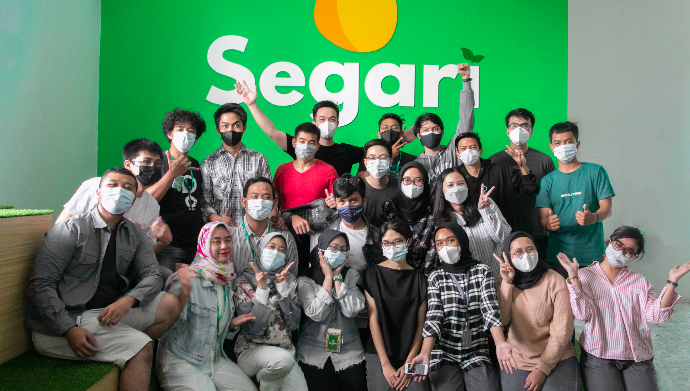
In Indonesia, one of the major problems facing the agriculture industry is the existence of multiple layers between the farmer and the end consumer.
As a result, farmers fail to obtain the right price for their produce and are forced to sell them for a song, with the middlemen taking the bigger chunk.
Segari, a startup born in the middle of the COVID-19 pandemic, wants to address this problem using technology, and it has already caught the attention of the region’s top VCs.
The grocery startup has just announced that it has secured what claims to be one of the largest seed funding rounds in Indonesia. Led by Singapore’s early-stage VC firm Beenext, it also saw participation from AC Ventures, Saison Capital and a few undisclosed angel investors.
Slides: Indonesia’s agritech ecosystem report 2019
Segari will use the capital to build the infrastructure needed from upstream to downstream while maintaining the quality of the produce.
“Although 30 per cent of Indonesia’s workforce is engaged in agriculture in one way or the other, many inefficiencies still exist in the industry. The existence of multiple layers between the farmer and the end customers is one,” said Segari co-founder Yosua Setiawan.
“While commerce is being disrupted by Tokopedia and Shopee, and the transportation industry by gojek and Grab, the agriculture sector has seen very little innovation. Segari wants to change this,” he added.
The company was founded in 2020 by the trio of Setiawan (CEO), Farand Anugerah (COO) and Farandy Ramadhana (CTO). A silver medalist at the National Physics Olympics, Setiawan has previously worked at Boston Consulting Group and Traveloka.
Anugerah, a Harvard Business School alumnus, has in the past worked at Grab Indonesia & Philippines. Ramadhana is an alumnus of UC Berkeley and worked at Amazon, Google Ads team in Silicon Valley and Moka before co-founding Segari.
How Segari works
A consumer can place his orders on Segari’s website or mobile app before 5 pm. Segari’s team will then fulfil the orders with the farmers and suppliers, bring the items to the warehouse, check for the quality, and then package them. By 6 am the next day, the startup’s logistics team takes the items from the warehouse for delivery before 10 am.
The startup says it is working with thousands of farmers all around Java and several vegetable farmer communities in West Java. The company helps them make decisions about what to plant, how much and when to harvest.
It also has communities of fruit farmers in Central Java where it has contracted for specific grades of fruits at specific prices, which allows Segari to have consistent and sufficient supply.
“To give the best freshness, our operation team ensures that it only takes 15 hours from harvest to your home for green vegetables. This involves extreme operational complexity. Because we do not keep inventory, we need to generate tight forecasting of customer demand, and balance it with the harvesting schedule of our farmers,” said COO Anugerah.
The startup says it employs experienced teams for quality check and product handling. It boasts of four different temperature areas in its warehouse to maintain the freshness of the produce.
For example, it keeps bananas at 16-20 degree Celsius so that they can ripe optimally, while the grapes are kept at -5 degree Celsius.
Trust deficit
According to the startup, despite the COVID-19 crisis, Indonesian consumers today are still reluctant to shop fresh produce and grocery products online. Most individuals living in Jakarta still go to supermarkets and traditional markets to purchase grocery items.
Surveys find that consumers still do not fully trust transacting online for fresh produce, fearing that they may receive bad quality produce. Those who have attempted to shop fresh produce online share that the quality they receive is inconsistent.
“Getting to a high level of quality and consistency is hard. Not everyone can do it, but that’s why we make it our focus. While other players may focus on wide SKU variety, cheapest prices, or other areas, we build our infrastructure to focus on quality. This is what our customers love about us, and make many of them purchase from us every week,” said Setiawan.
Setiawan further shared that Segari leverages its micro-warehouses and network of thousands of agents all around Jakarta to help move tons of its fresh produce every day while maintaining its quality.
“Otherwise, you’ll end up with 15-30 per cent wastage, as seen in a typical supermarket. This is also partially the reason we can offer the highest quality produce at cheaper prices than most supermarkets,” said Anugerah.
—
Image Credit: Segari
The post Ex-Traveloka, Grab execs’ one-year-old online fresh grocery startup Segari raises seed funding led by Beenext appeared first on e27.

